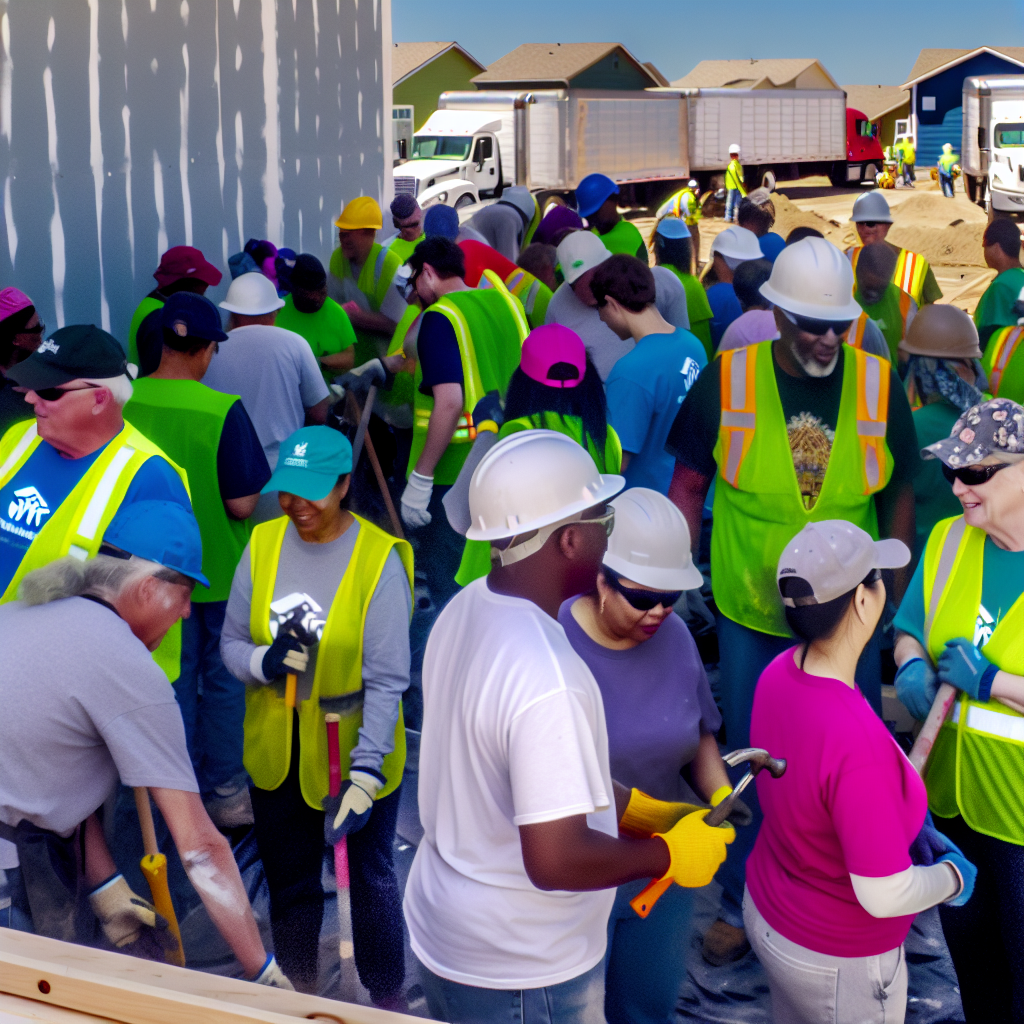In a world where community support initiatives are crucial for helping vulnerable populations, the trucking sector has stepped up as a strong ally. The initiative called Trucks for Change highlights this effort, showing how logistics and transportation professionals can positively impact their communities. A prime example of this is the partnership with Habitat for Humanity, where members of the trucking sector dedicate their time, resources, and skills to deconstruct homes, clearing the way for affordable housing solutions.
This commitment not only underscores corporate responsibility but also illustrates how dedicated the trucking industry is to improving the lives of those who need assistance. By coming together, organizations like Trucks for Change emphasize the importance of community, reinforcing the idea that every truck and driver plays a role in creating stronger neighborhoods.
Through countless volunteer hours and initiatives focused on sustainability, the trucking sector proves that its influence goes well beyond transporting freight; it reaches into the heart of communities, offering help to those who are most in need.
Recent statistics illustrate the profound impact of community support initiatives on affordable housing and volunteerism within the trucking sector, despite some limitations in specific data.
One notable example comes from a 2024 initiative where Travelers collaborated with Habitat for Humanity. Their employees contributed a remarkable 7,903 volunteer hours with 977 volunteers across 69 HFHI affiliates. This partnership not only bolstered community living conditions but also cultivated employee engagement and skill development. Likewise, the Ottawa Community Housing’s Volunteer Impact Report disclosed a staggering contribution of $428,249 from volunteer work, showcasing the economic and social advantages derived from corporate volunteerism, with over 40 corporations involved in meaningful community projects.
Additionally, programs like Interstates’ Engage Volunteer Program highlight how in 2021, volunteers across the U.S. contributed over 4.1 billion hours of service, valued at approximately $122.9 billion. This demonstrates the potential benefits realized through employee participation in community initiatives, fostering stronger community bonds and enhancing job satisfaction.
While the trucking sector’s specific contributions may not be extensively documented, they likely resonate with these wider trends that reveal the positive impact of corporate volunteerism in improving community welfare and supporting affordable housing initiatives.
Betsy Sharples, executive director of Trucks for Change, emphasized the importance of the partnership with Habitat for Humanity by stating, “Habitat for Humanity events are always popular and a highlight for our T4C partners. This initiative is another example of the trucking sector’s deep-rooted commitment to supporting vulnerable Canadians in communities where we live and work — whether we’re delivering essential goods or rolling up our sleeves to help build brighter futures.”
This quote reinforces how vital collaboration is to community support initiatives, showcasing the trucking sector’s dedication to not only providing services but also actively participating in the well-being of those in need.
Trucks for Change Activities with Habitat for Humanity
Trucks for Change (T4C) has been actively collaborating with Habitat for Humanity to support vulnerable populations through various initiatives, including deconstruction projects and multi-home builds.
In early September 2025, T4C members assisted Habitat for Humanity in deconstructing a home in the Waterloo, Ontario area. This effort was aimed at clearing the site for a future multi-home build that will provide safe, affordable housing for local families. Over 30 volunteers from six partner organizations participated in this project. This marks the sixth year of partnership between T4C and Habitat for Humanity, with T4C members collectively contributing over 2,000 hours of assistance during this period. Source
The deconstruction process involves carefully dismantling existing structures to salvage reusable materials, which can then be repurposed in new construction projects. This approach not only reduces waste but also supports Habitat for Humanity’s mission to provide affordable housing by lowering material costs. For instance, Habitat for Humanity of Kansas City offers deconstruction services to homeowners and contractors, removing items like kitchen cabinets, appliances, and doors before renovations. These salvaged materials are then sold at Habitat ReStores, with proceeds supporting the construction of affordable homes. Source
Through these collaborative efforts, T4C and Habitat for Humanity are making significant strides in assisting vulnerable populations by providing them with safe and affordable housing options.
| Partner Organization | Contributions | Volunteer Hours |
|---|---|---|
| The Erb Group | Assisted in home deconstruction | Approx. 333 |
| Kriska Transportation Group | Contributed to material salvaging | Approx. 333 |
| Mill Creek Motor Freight | Provided logistics and support | Approx. 333 |
| Northbridge Insurance | Engaged in employee volunteering | Approx. 333 |
| Tandet | Supported community outreach | Approx. 333 |
| TransPro Freight Systems | Participated in team initiatives | Approx. 333 |
| Total | Collectively engaged for Habitat | 2000+ hours |
Note: Volunteer hours per organization are approximations based on total contributions since partner inception and the number of events held.

Image showing a community volunteering scene with people working together on a Habitat for Humanity project, depicting trucks in the background and showcasing teamwork and support.
In conclusion, the trucking sector’s unwavering commitment to community support initiatives, exemplified by programs like Trucks for Change, continues to make a meaningful difference in the lives of vulnerable populations. Through partnerships with organizations such as Habitat for Humanity, the trucking industry demonstrates how its contributions extend far beyond transportation, addressing pressing social issues like affordable housing.
The collective efforts of volunteers and companies alike not only provide crucial resources and assistance but also foster a sense of unity and purpose within communities. As we reflect on the ongoing impact of these initiatives, it becomes clear that the spirit of generosity within the trucking industry serves as a catalyst for positive change.
Therefore, we encourage further community involvement, urging individuals and businesses alike to join forces with initiatives that uplift those in need and foster a more inclusive society. Together, we can continue to build a brighter future for all.
Trucks for Change has made a significant impact in terms of volunteer engagement and assistance provided to Habitat for Humanity. More than 30 volunteers from six partner organizations participated in a recent deconstruction event in September 2025. This marks the sixth consecutive year that Trucks for Change has partnered with Habitat for Humanity to support community housing initiatives.
Over these years, Trucks for Change has collectively provided more than 2,000 hours of assistance to Habitat for Humanity, illustrating the organization’s deep commitment to helping vulnerable populations. Betsy Sharples, executive director of Trucks for Change, emphasized the importance of these efforts, stating that, “Habitat for Humanity events are always popular and a highlight for our T4C partners. This initiative is another example of the trucking sector’s deep-rooted commitment to supporting vulnerable Canadians in communities where we live and work.”
This steadfast dedication not only supports the construction of affordable housing but also fosters community engagement and collaboration among various organizations within the trucking industry.
Significance of Community Support Initiatives by the Trucking Sector
The significance of community support initiatives within the trucking sector is profound, as these efforts transcend mere corporate responsibility. The trucking industry, a backbone of the economy, plays a critical role in addressing societal challenges, particularly for vulnerable populations. Initiatives like Trucks for Change highlight the essential contributions of trucking companies toward enhancing community welfare. By engaging in such activities, the industry helps foster social cohesion, economic development, and environmental sustainability.
One of the key impacts of community support initiatives is their ability to uplift marginalized groups by providing essential services and resources. The collaboration between Trucks for Change and Habitat for Humanity serves as an exemplary model, as it emphasizes how trucking companies can utilize their logistical expertise and workforce for the betterment of society. The deconstruction of homes for future renovations not only promotes affordable housing but also reduces waste and environmental impact.
Moreover, the active involvement of the trucking sector in community volunteerism reflects a commitment to corporate social responsibility (CSR). This commitment not only enhances the public image of companies but also builds trust and loyalty among consumers. Companies engaged in community involvement are often perceived as more compassionate and socially aware, which can significantly influence customer preferences and purchasing decisions.
In essence, community support initiatives by the trucking sector highlight the interconnection between business operations and societal well-being. Companies that invest time and resources into these initiatives are not only contributing to immediate needs but are also laying the groundwork for sustainable community development. As the trucking industry continues to evolve, the importance of such community engagement will only grow, reinforcing the idea that supporting the community is not just a choice but a business imperative.
“This initiative is another example of the trucking sector’s deep-rooted commitment to supporting vulnerable Canadians in communities where we live and work,” said a representative from Trucks for Change, reinforcing the sector’s unwavering dedication to those in need while collaborating with organizations like Habitat for Humanity.
Key Statistics on Community Support Initiatives
- Volunteers: Over 30 volunteers from six partner organizations participated in a recent event to assist in deconstructing a home for Habitat for Humanity.
- Years of Partnership: This marks the sixth consecutive year that Trucks for Change has collaborated with Habitat for Humanity.
- Hours Contributed: Trucks for Change has cumulatively provided more than 2,000 hours of assistance to Habitat for Humanity since the partnership began.
- Volunteer Engagement in Other Initiatives: In a 2024 initiative by Travelers, employees contributed 7,903 volunteer hours with 977 volunteers across 69 HFHI affiliates.
- Economic Impact of Volunteering: The Ottawa Community Housing’s Volunteer Impact Report noted a total contribution of $428,249 from volunteer work, reflecting the social and economic benefits derived from corporate volunteerism.
Quotes
“Habitat for Humanity events are always popular and a highlight for our T4C partners,” said Betsy Sharples, executive director of Trucks for Change.
“This initiative is another example of the trucking sector’s deep-rooted commitment to supporting vulnerable Canadians in communities where we live and work.”
Through their meticulous volunteer efforts, the trucking sector demonstrates not just a commitment to assistance, but a profound understanding of the needs within their communities. As highlighted in the recent collaborations between Trucks for Change and Habitat for Humanity, these initiatives pave the way for more than just physical spaces; they create environments filled with hope and opportunity for vulnerable populations. Furthermore, the camaraderie and teamwork exhibited during these volunteer activities embody the spirit of community engagement, which is an essential aspect of corporate responsibility.
As we look towards the conclusion, it becomes evident that the trucking sector’s engagement in such programs serves a dual purpose: they not only address immediate needs but also build lasting bonds within the community. It is this unity that propels the sector forward, encouraging further participation and collective action.
In conclusion, the trucking sector’s unwavering commitment to community support initiatives, exemplified by programs like Trucks for Change, continues to make a meaningful difference in the lives of vulnerable populations. Through partnerships with organizations such as Habitat for Humanity, the trucking industry demonstrates how its contributions extend far beyond transportation, addressing pressing social issues like affordable housing. The collective efforts of volunteers and companies alike not only provide crucial resources and assistance but also foster a sense of unity and purpose within communities. As we reflect on the ongoing impact of these initiatives, it becomes clear that the spirit of generosity within the trucking industry serves as a catalyst for positive change. Therefore, we encourage further community involvement, urging individuals and businesses alike to join forces with initiatives that uplift those in need and foster a more inclusive society. Together, we can continue to build a brighter future for all.


